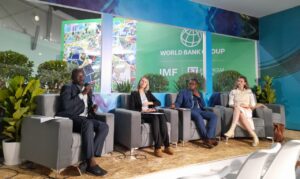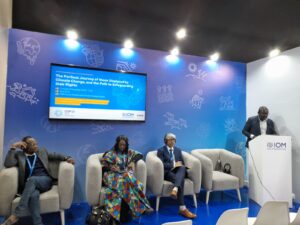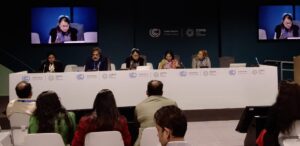COP29, held from November 11-22, 2024, in Baku, Azerbaijan, will spotlight climate finance and urgent action against global warming. Leaders, NGOs, and civil society representatives will push for updated climate plans, aligned with the Paris Agreement, to limit warming to 1.5°C. GNDR and its members are actively participating, urging inclusion and climate justice, particularly for vulnerable communities disproportionately affected by climate impacts.
GNDR staff and members are in Azerbaijan representing the voice of civil society. Follow their updates from Baku:
Monday 18 November 2024
UNEP Adaptation Gap Report
This UNEP hosted high-level session was an opportunity to discuss the Adaptation Gap Report 2024. The key findings are:
- Global coverage of national adaptation planning instruments is possible by 2030
- 87% of countries have at at least one national adaptation planning instrument, however, the pace of implementation is slow
- Nations must dramatically step up adaptation, starting with a commitment to act on finance at COP29
- International public adaptation finance flows are rising, but there remains a huge gap between what is needed and what is being delivered
Key asks:
- Bridging the enormous adaptation finance gap must be a priority for COP29
- To address the climate challenge, adaptation financing needs to shift from a focus on short-term, project-based and reactive action, towards anticipatory, strategic and transformational adaptation
- Capacity building and technology transfer needs to be more effective. Capacity building and technology transfer should be part of broader development strategies.
- COP29 must mark the moment when we realise the ambition for adaptation.
Tuesday 19 November 2024
Safeguarding Agrifood Systems: Coherent Approaches to Disaster and Climate Resilience
GNDR’s Climate Lead, Adessou Kossivi was on the panel for this World Bank session that discussed the food system and comprehensive risk management. Agriculture is the most vulnerable sector to climate change and disasters, with cascading effects of conflicts. Animesh from UNDRR shared that comprehensive risk management and good governance are crucial for resilience building. Adessou provided examples from our Views from the Frontline (VFL) project, specifically one from Mali. To safeguard Agrifood systems, it’s critical to:
- Engage the local community
- Leverage local knowledge
- Provide communities with access to local resources
- Reduce greenhouse gases
- Protect the whole supply chain system
- Connect local actors with national actors
- Implement nature-based solutions
- Connect evidence-based research with policies

Adessou Kossivi on the World Bank hosted panel: Safeguarding Agrifood Systems: Coherent Approaches to Disaster and Climate Resilience
The perilous journey of those displaced by climate change, and the path to safeguarding their rights
GNDR member, Koudjo Adjeoda, from Action pour le Development du Sahel, shared three strategies he is working on with displaced people:
- Inclusion of local actors
- Household security
- Use of natural resources and safeguarding water, land and food.
He also highlighted community-based adaptation planning and localisation of actions, partnership building, and capacity building. He worked in areas where armed groups like Boko Haram were present. This required resources for the community to reduce the risk of displacement. The specific support to youth is preventing them from joining the armed groups. It can also help safeguard women from sexual abuse.
Glorius Bulus, a GNDR member from Bridge that Gap Hope for Africa Initiative, shared her experience with extreme weather events and how it is leading to displacement. This in turn impacts agriculture leading to hunger and poverty. These natural hazards are joined by the cascading effects of conflicts.
Abul Basar, a GNDR member from Helvetas, Bangladesh, discussed two types of displacement;
- where communities either they have to migrate due to disasters or climate change impacts – including both pre-post disaster stages.
- displacement from rural to urban areas. A lot of people migrate with the hope of a new livelihood. These big hopes can end in an inhumane life without dignity unless the correct policies are in place.
During displacement, many people cannot take their belongings and lose their social network – government policies should have the scope to look at all of these scenarios. In urban displacement, often, if you don’t have an identity card, you cannot enrol in schools, get electricity or other basic services so policies should take a forward-looking approach by considering children’s needs and improving the skills of displaced people. It’s also critical that a greater emphasis is placed on women’s protection. A comprehensive management plan for climate change could go a long way in helping.
All our speakers concluded that the issue of displacement needs to be prioritised in loss and damage negotiations. However, finance alone cannot find the solutions – this finance needs to leverage the implementation of relevant, impactful actions.

GNDR’s Adessou Kossivi and panelists (L-R) Télesphor Adjeoda Koudjo, ADESA, Gloria Bulus, Bridge that Gap Initiative, and Abul Basar, Helvatas, at our COP29 side event: The perilous journey of those displaced by climate change.
Meeting with IOM Deputy Director General for Operations, Ugochi Daniels
The IOM DGO asked the CSOs present about the greatest challenge they face as we prepare for the next COP. Participants emphasised the need to do more to recognise the efforts of CSOs. This means:
- Engagement of refugees in high-level sessions
- A strategy that goes beyond COP
- We need to break down silos in our work
- We need to address the lack of actionable data
This year the conversation is bringing the voices of migrants to the table more than before. Countries affected by conflicts are having more displacement so it’s welcome that the Baku plan is integrating displacement into their texts. But there’s still a long way to go to integrate the nexus of disaster-displacement-development.
Wednesday 20 November 2024
Climate Crisis, Women and Water Governance
GNDR’s Policy and Research Officer, Jekulin Lipi, joined a session on the Role of the global community in managing disaster risk effectively to save the community, especially women and girls.
Jekulin said:
“GNDR champions local voice, local leadership, and localisation. We advocate for decision-makers to listen to the community, and we also focus on gender equity and equality and the specific skills and capacity women leaders have.”
- Gender equality is one of the key risk drivers
- Through various network roles of convening, collaborating, training and capacity building, GNDR reaches out to women-led organisations and women most at risk
-
GNDR amplifies women’s voices and nurtures their leadership in DRR efforts through its range of programmes.
- Our Views from the Frontline survey of more than 11,000 women categorically demonstrated the lack of accessibility of information and resources as one of the major factors preventing their inclusion in DRR processes
- To support these women, local CSOs, and women leaders, GNDR through its Women Leaders Mentorship Programme, provides space for women to share and learn about gender inequality as a driver of disaster risk
- This initiative ensures the systematic inclusion of women leaders’ skills, perspectives, and experiences in development plans and activities.
- Besides that, GNDR supports women in lifting their skills in DRR & climate change adaptation (CCA) and supporting their access to global spaces in DRR and CCA to raise their voices through various programme interventions, such as:
- Resilience Livelihood Programmes – Almost 92 women across Pakistan, Bangladesh, Sri Lanka, Benin, Rwanda, Paraguay and the Dominican Republic were supported to lift their skills and test innovative ways to improve the livelihoods and resilience of communities.
- Women-Led Early Warning Anticipatory Action Programmes – Currently, GNDR is supporting 10 local women organisations in the Philippines and Indonesia to develop their own Standard Operating Processes for setting triggers of Early Warnings and developing contingency plans for Anticipatory Actions. These women are supported, trained and facilitated by the national members of GNDR.
- In Latin America and the Caribbean region, GNDR convenes the Women Network on DRR and supports women-led organisations to influence and practices at the regional and national level on DRR and CCA

GNDR’s Policy and Research Officer, Jekulin Lipi, on the panel for: Role of the global community in managing disaster risk effectively to save the community, especially women and girls
Anticipatory Action to Avert, Mitigate, and Address Climate-related Loss and Damage
GNDR’s Africa Regional Lead and Climate Lead. Adessou Kossivi, presented our Locally Led Anticipatory Action Guide and Toolkit during our side event. This session engaged different actors in the reflection around the Anticipatory Action. It explored the existing gaps and the possible solutions to fill the gaps. The speakers emphasised the importance of inclusiveness in promoting anticipatory actions and the funding mechanism to meet shared objectives.
Dr Blalogoe Parfait, highlighted that anticipatory actions could strengthen resilience and it should be community-led. Farah Kabir, Country Director, ActionAid, Bangladesh emphasised the importance of comprehensive actions, capacity building and investments required for anticipatory actions. Zakir Hossain, a GNDR member, mentioned the importance of risk-informed development. Our last speaker, Christina Aebischer, Advisor, Climate Adaptation & Advocacy, HELVETAS Swiss Intercooperation, shared that access to information is crucial.